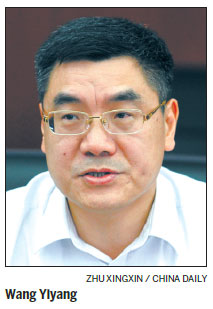Guangdong Special: Expert: Province is still reforming, still No 1
Although its economic growth was slower than expected in the first quarter of the year, Guangdong province remains on track to steady, high-quality development, said a local expert.
Wang Yiyang, head of the provincial government's development research center, made the remarks during a recent press conference in Guangdong's capital city Guangzhou.
In the first three months, provincial GDP hit 1.36 trillion yuan ($217.7 billion), up 7.2 percent.
"The economy, though sliding a little bit, is still growing moderately as we expected," said Wang.
Tax and other government revenues totaled 643.5 billion yuan in the period, up 20.8 percent.
The vanguard of China's opening-up and reform in the late 1970s, Guangdong has grown from a province with a weak economy to a powerhouse.
Its aggregate economy tops the nation, with GDP reaching 6.22 trillion yuan in 2013, ranking it first for the 25th consecutive year, said Wang.
Its revenue and volume of exports and imports in 2013 also ranked first among all provinces.

Wang said higher quality and efficient economic growth can be seen in an improved industrial structure and integrated economic development among different regions in Guangdong.
In first three months of the year, GDP generated by the service industry was the largest among three core economic sectors, surpassing agriculture and manufacturing.
The government also has stepped up efforts to further develop the economies in eastern, western and northern parts of the province.
The GDP in those regions maintained steady growth to become a new economic engine, said Wang.
Wang added that by March average disposable per capita income for residents reached 7,139 yuan, up 7.4 percent.
"Since the late 1970s, Guangdong has developed a very mature economy with a lot of experience in opening-up and reform. It has become the role model for the whole country," said Wang.
The economist noted that the reform has gone through three phases.
In the latest phase starting in 2008, Guangdong has been working on a modern economic system by adopting a "double shift" strategy - shifting its economic emphasis from manufacturing to services and moving manufacturing industries from the Pearl River Delta to the less-developed regions in the eastern, western and northern parts of the province.
Wang said Guangdong will continue developing a free trade zone connected to Hong Kong and Macao and start to develop new economic areas in Nansha, Qianhai and Hengqin.
It will also initiate more cooperative projects with Southeast Asian countries and strengthen trade ties with countries along the ancient "maritime Silk Road", he said.
fuchao@chinadaily.com.cn
(China Daily 06/26/2014 page10)














